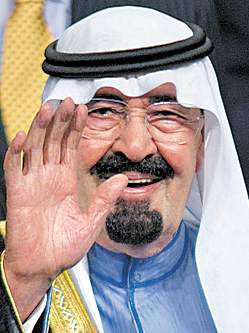King’s battle with clerics is shaping country’s future
Published 5:00 am Wednesday, October 20, 2010

- King Abdullah's clashes with clerics such as al-Sheikh highlights a shift in Saudi culture away from the dominance of strict Islamic law.
RIYADH, Saudi Arabia — When Saudi King Abdullah appeared in a newspaper photo with 40 veiled women in April, he broke a taboo by mixing with the opposite sex in public.
Since then, the 86-year-old monarch has crimped the power of conservative Muslim clerics more than any of his five predecessors since the foundation of the kingdom in 1932. He prohibited unauthorized religious edicts, or fatwas, and shut down some of the websites where they’re issued. In the past month, he backed supermarkets employing females for the first time.
“This is really a part of the struggle over who controls Saudi Arabia,” Robert Lacey, author of 2009 book “Inside the Kingdom,” said in a telephone interview from the Saudi city of Jeddah. “Ten to 15 years ago, it would have been very difficult for a Saudi king to discipline the clergy.”
The economic angle
The friction between king and clerics underscores a shift in Saudi society away from the dominance of strict Islamic law. The king is spearheading the move by forging a Saudi national identity and bringing women into the work force as part of an attempt to make the economy less dependent on oil.
The kingdom was founded after a 30-year campaign of conquest by the current king’s father, Abdulaziz, that extended the Al Saud family’s control beyond the ancestral home around Riyadh.
“The fatwa ban will allow the government to take more antagonizing economic measures, if needed, without fearing independent clerics,” Mohammed al-Qahtani, an economist working at the Institute of Diplomatic Studies in Riyadh, said in an interview. “It definitely silenced independent clerics.”
Under a pact dating back to 1744 between the Al Saud and Muhammad bin Abdul Wahhab, the kingdom maintains an austere brand of Islam, known as Wahhabism, in return for the Sunni Muslim hierarchy’s acceptance of the crown.
Sending a message
Saudi Arabia depends on oil exports to expand its economy and provide social benefits to its people. The king wants to enhance job skills, and develop science and technology to diversify the economy.
The government announced in August a $385 billion, five-year spending plan as the kingdom tries to reduce a jobless rate of as high as 43 percent for Saudis between the ages of 20 and 24. The overall rate was 10.5 percent in 2009, according to data from the Central Department of Statistics and Information.
The same month, King Abdullah issued a royal decree allowing only the Council of Senior Islamic Scholars to issue religious edicts. The communications authority closed websites for violating the decree, Sultan al-Malik, a spokesman for the regulator, said in September.
“It sends a message of deterrence to clerics around the country to make them think twice before they issue a controversial statement or an inflammatory remark,” Thomas Hegghammer, a senior research fellow at the Oslo-based Norwegian Defense Research Establishment and the author of “Jihad in Saudi Arabia,” published in April.






